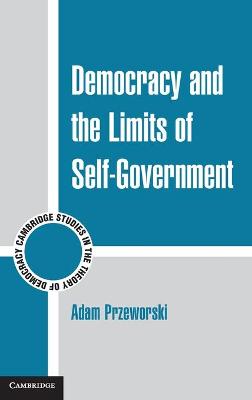Cambridge Studies in the Theory of Democracy
2 total works
Democracy and Development
by Adam Przeworski, Michael E. Alvarez, Jose Antonio Cheibub, and Fernando Limongi
Published 28 August 2000
Is economic development conducive to political democracy? Does democracy foster or hinder material welfare? These two questions are examined by looking at the experience of 135 countries between 1950 and 1990. Descriptive information, statistical analyses, and historical narratives are interwoven to gain an understanding of the dynamic of political regimes and their impact on economic development and other aspects of material welfare. The findings, several most surprising, dispel any notion of a trade-off between democracy and development. Economic development does not generate democracies but democracies are much more likely to survive in wealthy societies. Political regimes have no impact on the growth of total national incomes, while political instability affects growth only in dictatorships. Per capita incomes grow faster in democracies since population increases faster under dictatorships. In general, political regimes have more of an effect on demography than on economics.
The political institutions under which we live today evolved from a revolutionary idea that shook the world in the second part of the eighteenth century: that a people should govern itself. Yet if we judge contemporary democracies by the ideals of self-government, equality and liberty, we find that democracy is not what it was dreamt to be. This book addresses central issues in democratic theory by analyzing the sources of widespread dissatisfaction with democracies around the world. With attention throughout to historical and cross-national variations, the focus is on the generic limits of democracy in promoting equality, effective participation, control of governments by citizens, and liberty. The conclusion is that although some of this dissatisfaction has good reasons, some is based on an erroneous understanding of how democracy functions. Hence, although the analysis identifies the limits of democracy, it also points to directions for feasible reforms.

